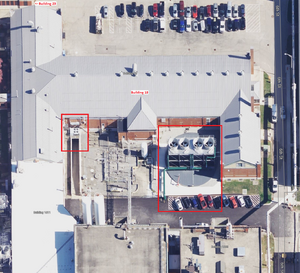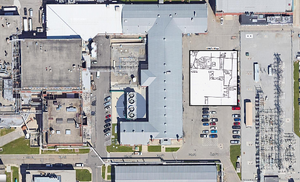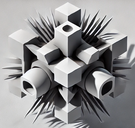Hangar 18
Also handles: Wright-Patterson Underground, Blue Room, Building 18
Refers to a facility at Wright-Patterson Air Force Base in Dayton, OH.

According to numerous whistleblowers and credible sources, including U.S. Senator Barry Goldwater[citation needed], a special facility exists underneath Wright-Patterson AFB for the purpose of storing NHI biologics/vehicles. These articles come about from crash recoveries, the network of vaults and cold rooms under WPAFB are believed to provide a remote environment for exploitation of this material.
Location[edit | edit source]


Hangar 18 is probably a misnomer for Building 18, the Power Plant Laboratory Complex, one of the oldest structures at Wright-Patterson. One part of this, Building 18F, included cold rooms used for low-temperature testing of engines and other equipment.[1][2] This facility has also been called the Blue Room.
Accounts[edit | edit source]
Frank Scully's book Behind the Flying Saucers (1950) described claims that wreckage and dead aliens from the alleged Aztec, New Mexico UFO crash had been taken to Wright-Patterson, where they were being analysed by scientists and engineers.
In 1966, the book Incident at Exeter by journalist John G. Fuller mentioned 'frequent and continual rumors' of 'a half-dozen or so small humanoid corpses, measuring not more than four-and-a-half feet in height' in an Air Force morgue at Wright-Patterson Field.[3]
Robert Spencer Carr[edit | edit source]
On October 11, 1974, science-fiction author and UFO conspiracy theorist Robert Spencer Carr conducted a live radio interview where he publicly claimed that alien bodies recovered from the Aztec, NM crash were being kept at "Hangar 18" at Wright-Patterson.[4][5] The claim garnered substantial press attention, and led to official denials.[6] The Air Force replied that no "Hangar 18" existed at the base (perhaps somewhat disingenuously, given the existence of Building 18), and noted Carr's claims bore a close similarity to the fictional Fortec Conspiracy.[7]
During the interview, Carr also relayed a tale of Senator Barry Goldwater requesting and being denied access to a restricted area. Reached for comment, Goldwater admitted to having requested a tour and been denied, but Goldwater said he'd never heard any rumors of alien bodies.[8]
Whether or not Goldwater had inquired about aliens at the time, he certainly did later. On March 28, 1975, he wrote to Shlomo Arnon: "The subject of UFOs has interested me for some long time. About ten or twelve years ago I made an effort to find out what was in the building at Wright-Patterson Air Force Base where the information has been stored that has been collected by the Air Force, and I was understandably denied this request. It is still classified above Top Secret."[9] Goldwater further wrote that there were rumors the evidence would be released, and that he was "just as anxious to see this material as you are, and I hope we will not have to wait much longer".[9][10][11] The April 25, 1988, issue of The New Yorker carried an interview with Goldwater in which he recounted efforts to gain access to the room.[12] He did so again in a 1994 Larry King Live interview, saying:[10][11]
I think the government does know. I can't back that up, but I think that at Wright-Patterson field, if you could get into certain places, you'd find out what the Air Force and the government knows about UFOs ... I called Curtis LeMay and I said, 'General, I know we have a room at Wright-Patterson where you put all this secret stuff. Could I go in there?' I've never heard him get mad, but he got madder than hell at me, cussed me out, and said, 'Don't ever ask me that question again!'[13]
By September 1979, Carr claimed to have interviewed five eyewitnesses to the recovery, including a surgical nurse who witnessed an alien's autopsy.[14][15]
The 1980 film Hangar 18, which dramatized Carr's claims, was described as "a modern-day dramatization" of the Roswell incident by the film's director James L. Conway,[16] and as "nascent Roswell mythology" by folklorist Thomas Bullard.[17] Decades later, Carr's son recalled that he had often "mortified my mother and me by spinning preposterous stories in front of strangers... [tales of] befriending a giant alligator in the Florida swamps, and sharing complex philosophical ideas with porpoises in the Gulf of Mexico."[18]
Leonard H. Stringfield[edit | edit source]
Claims that alien bodies were being hidden by the military were also popularized by longtime UFO researcher Leonard H. Stringfield. Stringfield claimed analysis of bodies and UFO crash debris was being conducted at Wright-Patterson Air Force Base, however no connection to Roswell was specified.[19][20] In July 1978, Stringfield spoke about alleged crash retrievals at the international MUFON symposium held in Dayton, Ohio.[21] Also in attendance were Donald Keyhoe, J. Allen Hynek, and Ted Bloecher.[15] Stringfield wrote a seven part series on his research titled Status Report I-VI as a follow-up to this talk.[22]
References[edit | edit source]
- ↑ "Wright-Patterson Air Force Base, Area B, Building 18, Power Plant Laboratory Complex, Northeast corner of C & Fifth Streets, Dayton, Montgomery County, OH". Library of Congress. Retrieved 22 December 2024.
- ↑ Smith, Toby (2000). Little Gray Men: Roswell and the Rise of a Popular Culture. Albuquerque: University of New Mexico Press. p. 76}. ISBN 978-0826321213.
- ↑ Fuller, John G. (1966). Incident at Exeter. G.P. Putnam's Sons. pp. 87–88.: "There have been, I learned after I started this research, frequent and continual rumors (and they are only rumors) that in a morgue at Wright-Patterson Field, Dayton, Ohio, lie the bodies of a half-dozen or so small humanoid corpses, measuring not more than four-and-a-half feet in height, evidence of one of the few times an extraterrestrial spaceship has allowed itself either to fail or otherwise fall into the clutches of the semicivilized Earth People."
- ↑ Disch, Thomas M. (Jul 5, 2000). The Dreams Our Stuff is Made Of: How Science Fiction Conquered the World. Simon and Schuster. ISBN 9780684859781., "Even the Roswell case [...] has its component of science-fictional fraud. Robert Spencer Carr became famous, briefly, in the '70s when, in a radio interview, he concocted the still-current story of aliens' autopsied and kept in cold storage at the Wright-Patterson Air Force Base, near Dayton, Ohio."
- ↑ Moseley, James W. (2 November 2010). Shockingly Close to the Truth!: Confessions of a Grave-Robbing Ufologist. Prometheus Books. ISBN 978-1-61592-541-4.
- ↑ "UFO-oria's Back Again". The Cincinnati Enquirer. Cincinnati, OH. October 12, 1974. p. 29.
- ↑ "Dayton Daily News". Newspapers.com. Oct 12, 1974. p. 1.
- ↑ "Goldwater, contacted at his home in Phoenix, told The Enquirer he had indeed made such a request, 'But that was at least 12 or 15 years ago. Good God. That's so long ago I can't remember. The answer was negative, but I was an officer so I followed orders. What's this business about 12 little men? That's a new one on me.'" source
- ↑ 9.0 9.1 "FOIA documents". Anomalies. Archived from the original on March 7, 2012. Retrieved March 3, 2012.
- ↑ 10.0 10.1 Birnes, William J. (2004). The UFO Magazine UFO Encyclopedia: The Most Compreshensive Single-Volume UFO Reference in Print. Simon and Schuster (Pocket Books). p. 145. ISBN 978-0743466745. Archived from the original on June 19, 2022. Retrieved May 30, 2021.
- ↑ 11.0 11.1 Kean, Leslie (2010). UFOs: Generals, Pilots, and Government Officials Go on the Record. Crown Publishing Group. p. 243. ISBN 978-0307717085. Archived from the original on June 19, 2022. Retrieved May 30, 2021.
- ↑ Bernstein, Burton (April 25, 1988). "AuH2O". The New Yorker. 43, 71.
- ↑ YouTube clips:
- "Larry King, 1994 Barry Goldwater UFO room at Wright Patterson AFB". YouTube. Archived from the original on October 30, 2021.
- "Larry King, 1994 Barry Goldwater UFO room at Wright Patterson AFB". YouTube. October 23, 2017. Archived from the original on October 30, 2021.
- ↑ "Air Force Freezes Ufo Story | Ann Arbor District Library". aadl.org.
- ↑ 15.0 15.1 Peebles, Curtis (March 21, 1995). Watch the Skies!: A Chronicle of the Flying Saucer Myth. Berkley Books. ISBN 9780425151174. "Stringfield described the evidence Carr had collected on the Aztec "crash." Carr said he had found five eyewitnesses to the recovery. One (now dead) was a surgical nurse at the alien's autopsy. Another was a high-ranking Air Force officer. Two others were aeronautical engineers who described the UFO's structure and systems. The final witness was an Air Force enlisted man who had been a guard." citing Stringfield (Sept 1979) Retrievals of the Third Kind, part 2
- ↑ Erdmann, Terry J.; Block, Paula M. (2000). Deep Space Nine Companion. New York: Simon and Schuster. ISBN 978-0671501068.
- ↑ Bullard, Thomas E. (2016). The Myth and Mystery of UFOs. Lawrence: University Press of Kansas. ISBN 978-0-7006-2338-9.
- ↑ Carr, Timothy (July 1997). "Son of Originator of 'Alien Autopsy' Story Casts Doubt on Father's Credibility" (PDF). Skeptical Inquirer. Vol. 21, no. 4.
- ↑ Pflock, Karl (2001). Roswell: Inconvenient Facts and the Will to Believe. Amherst, New York: Prometheus Books. p. 35. ISBN 978-1573928946.
- ↑ Cite error: Invalid
<ref>tag; no text was provided for refs namedZeigler, 13-14 - ↑ "Dayton Daily News". Newspapers.com. Jul 27, 1978. p. 16.
- ↑ "Who's Who in Ufology – Leonard Stringfield". NICAP.org – archived NICAP page. Archived from the original on 2013-09-12.

